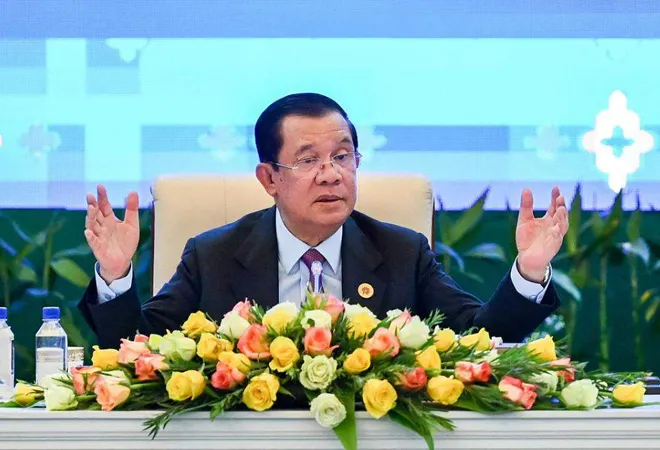
This year’s Association of Southeast Asian Nations (ASEAN) Summit
hosted by Cambodia from 10-13 November 2022, in Phnom Penh was the first in-person meeting held after the outbreak of the COVID-19 pandemic in 2020. This meeting took place against the backdrop of the Russia-Ukraine war which has impacted the entire notion of the rules-based order in the Indo-Pacific and the idea of sovereignty. Besides this, the ongoing United States (US)-China competition has created a stark divide amongst the ASEAN countries in terms of picking sides, and are often caught in the middle of this geopolitical tug of war. Other global issues such as climate change, global inflation, and rising food prices alongside Russia’s invasion of Ukraine and the economic recovery from the COVID-19 pandemic were a part of the ASEAN Summit agenda. The ongoing crisis in Myanmar dominated the discussions at the Summit. Besides this, there were talks about the ongoing South China Sea (SCS) dispute, the Russia-Ukraine war, and the US-China tussle as well. A welcome development in this summit was that the 10 ASEAN member countries agreed in principle to
admit East Timor as the 11
th member of the grouping. Till full membership is granted, East Timor has been given observer status. Though no specific timeline for the accession has been set yet. Amongst the
notable outcomes of the three-day event included an improved free trade pact between ASEAN, Australia, and New Zealand and the US and India upgrading their respective relationships with ASEAN to “comprehensive strategic partnerships.”
A welcome development in this summit was that the 10 ASEAN member countries agreed in principle to admit East Timor as the 11th member of the grouping.
While taking over the chairmanship for 2022 from Brunei on 28 October 2021, Hun Sen, Prime Minister of Cambodia
stated, “Cambodia is committed to leading ASEAN under the theme “ASEAN A.C.T: Addressing Challenges Together” for harmony, peace, and prosperity in the whole region.” While the ASEAN was slated to address global challenges, there were concerns that the divisions in the grouping regarding issues ranging from the Russia-Ukraine war, the Myanmar coup, the US-China competition, the South China Sea dispute will all have a bearing on this year’s proceedings as well. The Cambodian Prime Minister flagged off the summit by
hoping that, “leaders would embrace a “spirit of togetherness in upholding open and inclusive multilateralism, pragmatism, and mutual respect in addressing the existential and strategic challenges we all face.”
The Myanmar crisis
At the ASEAN Summit on 11 November 2022, the leaders assessed the implementation of the Five-Point Consensus as agreed at the ASEAN Leaders’ Meeting in April 2021 and
found that “little progress achieved in the implementation of the Five-Point Consensus”. The Myanmarese Junta have already been boycotted from attending high-level ASEAN meetings. A statement issued on 11 November 2022,
read, “the regional bloc again called for the implementation of its “Five-Point Consensus,” which said “ASEAN is committed to assist Myanmar in finding a peaceful and durable solution to the current crisis.” The statement
added, that for ASEAN, the “Five-Point Consensus shall remain our valid reference and should be implemented in its entirety even if it was being ignored by the junta in Myanmar.” But ASEAN still maintained that Myanmar remains an integral part of the ASEAN and ruled out the need for the issue of any sanctions. This decision has not gone down well among many activists and analysts. Analysts are of the opinion that it is time for the ASEAN to take a stronger stand against the Myanmar issue, and the ASEAN actions have been very slow. Activists have
pointed out that, “The fact that ASEAN still hasn’t suspended the junta’s participation throughout the entire ASEAN system represents a continued lack of leadership on this issue and tacit permission for the junta to continue its crimes.” Analysts have also pointed out that till Cambodia is the chair, it is difficult to expect that a tougher line would be adopted given that according to
reports, “Russia and China are supplying both weapons and legitimacy to an otherwise isolated regime.” The Myanmar issue is also a bone of contestation between the US and China. But the Indonesian President, Joko Widodo has
suggested that there is a “need to broaden the ban on Myanmar political representatives at ASEAN events”. But there was no consensus reached on Indonesia’s proposal. The leaders, nonetheless, stressed the need for an
implementation plan, that is, “concrete, practical and measurable indicators with a firm timeline for the implementation of peace”, but sadly again there was agreement on the timeline. At the end, ASEAN leaders
issued a "warning to Myanmar to make measurable progress on a peace plan or risk being barred from the bloc's meetings, as social and political chaos escalates in the country.”
The statement added, that for ASEAN, the “Five-Point Consensus shall remain our valid reference and should be implemented in its entirety even if it was being ignored by the junta in Myanmar.”
The Russia-Ukraine War
The ASEAN member countries have been divided on this issue as well. Singapore has been the only country which agreed to impose sanctions on Russia and toed the western line. So it may be obvious that even in the ASEAN Summit, there will be efforts to not come out with very strong statements as some ASEAN countries such as Vietnam and Laos do still have strong ties with Moscow. Russia was represented by Foreign Minister, Sergei Lavrov and Ukraine's Foreign Minister Dmytro Kuleba was also in Cambodia. Kuleba
said, “he held direct talks with several leaders of ASEAN countries, during which he urged them to condemn Russia's invasion of Ukraine, warning that staying neutral was not in their interests.” He urged them “to prevent Russia from holding up the movement of Ukrainian agricultural products under a Black Sea grain deal, which could expire on 19 November”. He
said, “
I call on all ASEAN members to take every method possible to stop Russia from playing hunger games with the world.” Russia and the US
failed to agree on the harsh language for a joint statement following an 18-nation summit in Cambodia. The ASEAN
signed the Treaty of Amity and Cooperation with Ukraine earlier this month, thus, paving the way for the establishment of formal relations with Kyiv. Though the West, particularly the US has tried to isolate Russia, but the latter has still maintained its outreach to Southeast Asian countries, especially Myanmar and Vietnam. Therefore, again the division within the ASEAN here is apparent.
The ASEAN signed the Treaty of Amity and Cooperation with Ukraine earlier this month, thus, paving the way for the establishment of formal relations with Kyiv.
The US-China tussle
Both US President Biden and Chinese leader Xi Jinping were in the Cambodian capital to be a part of the series of key meetings of the ASEAN. The US elevated its relationship with the ASEAN to a comprehensive strategic partnership and Biden “promised to collaborate to build a region that is “free and open, stable and prosperous, resilient and secure. He
said, “I look forward to continuing our work together with ASEAN and with each one of you to deepen peace and prosperity throughout the region to resolve challenges from the South China Sea to Myanmar and to find innovative solutions to shared challenges.” On the other hand, Li Keqiang, the premier of the People's Republic of China (PRC) ,
told at the ASEAN+3 meeting that, “amid a turbulent global security situation, unilateralism and protectionism are surging, economic, and financial risks are rising, and global development is confronted with unprecedented challenges.”
The South China Sea dispute
The
joint statement adopted at the 20
th anniversary of the Declaration of Conduct of Parties (DOC) on the South China Sea at Phnom Penh on 11November 2022, seemed like a reiteration of the clauses DOC itself. The statement showed that the ASEAN clearly wanted to steer clear of any strong statements that would raise a finger at the actions of Beijing which has clearly time and again violated the clauses of the DOC. This would have shown that the ASEAN countries are siding with the US. The progress achieved in the Code of Conduct deliberations that is currently underway with China was appreciated. Though these deliberations have been undergoing for over a decade now. Besides this, the ASEAN leaders also
adopted a declaration on mainstreaming the four priority areas of the ASEAN Outlook on the Indo-Pacific (AOIP) within the ASEAN-led mechanisms. The statement recognised the
need for ASEAN “to forge and shape the vision for an open, transparent, and inclusive regional architecture and closer cooperation in the Indo-Pacific and to continue to maintain its central role in the evolving regional architecture in Southeast Asia and its surrounding regions.”
The US elevated its relationship with the ASEAN to a comprehensive strategic partnership and Biden “promised to collaborate to build a region that is “free and open, stable and prosperous, resilient and secure.
It is clear that the influence of big powers such as the US and China, and the growing competition between the two clouded the ASEAN summit. The division within the ASEAN on these critical issues which are impacting the regional stability in the Indo-Pacific and the Myanmar crisis was very much apparent. This summit was a great opportunity to again reinforce the past credibility of the ASEAN where it successfully resolved many sensitive issues, but again not much could be achieved except being able to get the global leaders together on the ASEAN platform and reiterating that ASEAN still is the facilitator of dialogues in the Indo-Pacific region.
The views expressed above belong to the author(s). ORF research and analyses now available on Telegram! Click here to access our curated content — blogs, longforms and interviews.



 This year’s Association of Southeast Asian Nations (ASEAN) Summit
This year’s Association of Southeast Asian Nations (ASEAN) Summit  PREV
PREV


